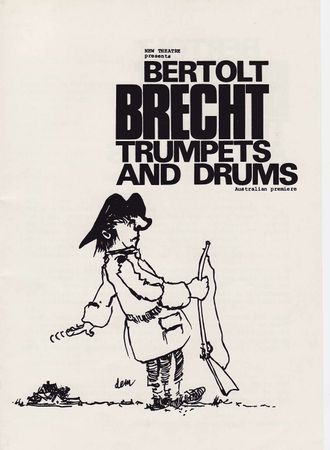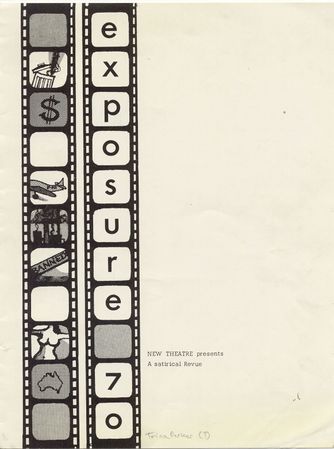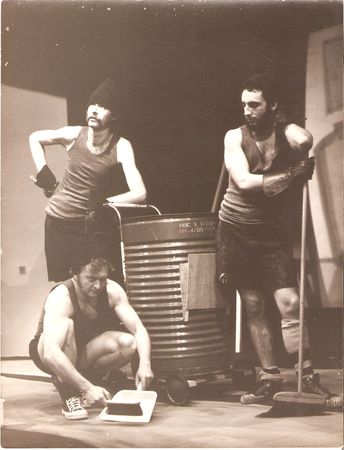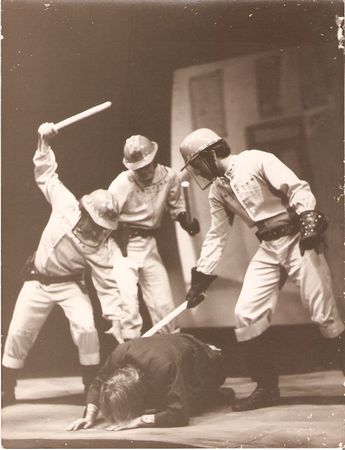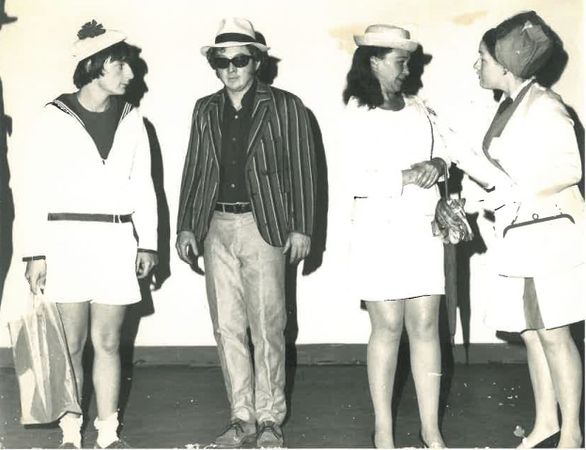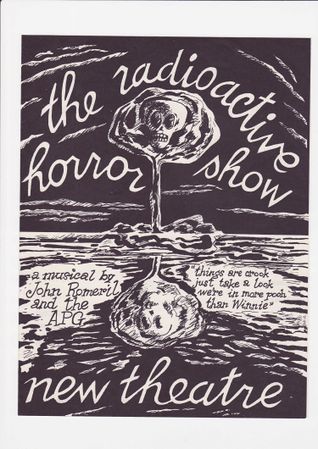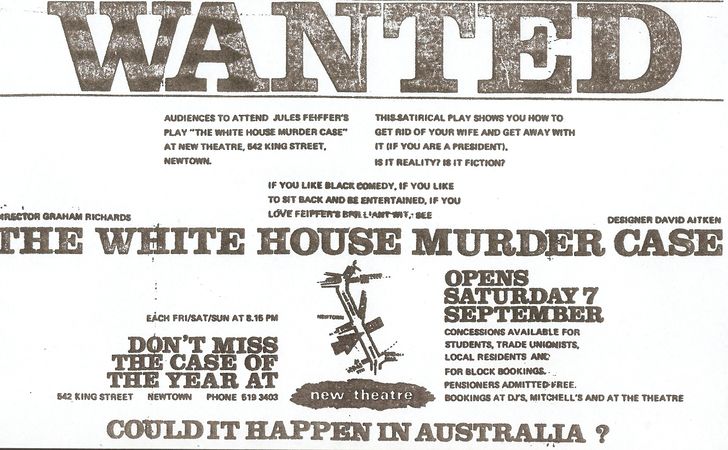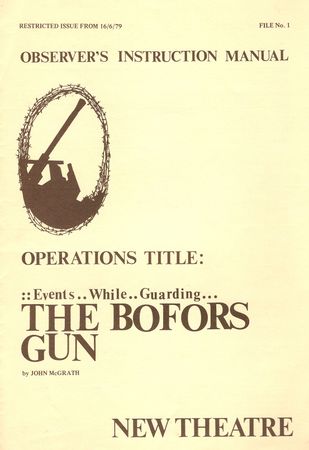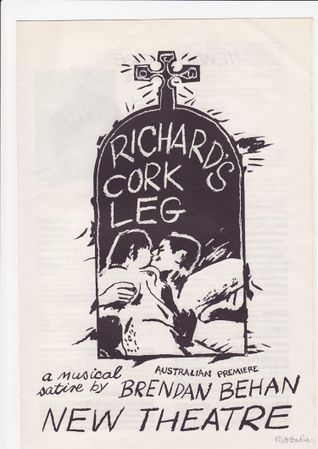The 1970s - War and Peace
New Theatre History Home | Previous: The 1970s - Premises | Next: The 1970s - Imperialism and Racism
NT remained affiliated with peace bodies such as the Association for International Co-operation and Disarmament, the Movement Against Uranium Mining, the Australian People’s Disarmament Conference, and anti-conscription and anti Vietnam War groups. It retained links with the Council for Civil Liberties and pro-Soviet organisations such as the Australia-USSR Society. NT supported Chilean Solidarity, Indo-China Solidarity, Youth Festival Cuba, and an independent East Timor.
Winner of a $100 NT Play Competition in 1969 was Pauline Mitchell, a peace activist and CPA member, whose Face of an Enemy was set among Australian troops in Vietnam. Judged as dramatically aware with an interesting story line, it was read during a Vietnam Moratorium but not given a mainstage production.
Conscription into the Vietnam War was held by birthday ballot: marbles with birth dates were picked out of a barrel lottery style. An item in Exposure 70 was Pat Flower’s “We’re all in this thing together”:
The son of a Liberal voter has been conscripted.
Somebody’s made a boo-boo
They’ve got their marbles mixed.
I’ve tried every wangle, dodge and finangle
To get the faux pas fixed.
I’ve badgered my local Member
I’ve pointed out the mistake
I’ve filled in swarms of triplicate forms
Exposure 70 also included John Dengate singing a satirical ditty about HMAS Melbourne, and the new fighter bomber on order from the USA but beset with technical problems:
Oh the F one double one it is a lovely plane
It flies at twice the speed of sound and scatters bombs like rain
Its wings go back and forward, it’s the latest thing around,
It’s a pity that it isn’t safe to take it off the ground.
The effect of the Algerian War on metropolitan France was examined in The Sunday Walk where acts of terrorism lead to indifference to the suffering of others.
On a Paris street there is the sound of an explosion but a family on their Sunday stroll continue their conversation. A shot is heard from the wings followed by a second. Grandfather falls dead.
Father puts his ear to Grandfather’s chest, then asks his wife for a mirror which he puts to Grandfather’s lips. He gets up and returns the mirror to his wife.
Father: No question about it, he’s dead … his heart’s stopped beating. Pause. A stray bullet. These things happen …
They continue walking.
David Campton’s Little Brother, Little Sister, workshopped in 1970, is a macabre fairytale of the aftermath of a nuclear war, while a program note for the 1971 Workshop of Jean-Paul Sartre’s adaptation of The Trojan Women warned of the devastation of an atomic war.
Street Theatre’s The Great International Uranium Show played at Lucas Heights, UNSW, Macquarie University and Mascot Fair in 1977. Discussions were held with guest speakers on the nuclear issue and uranium mining on Sundays after John Romeril’s The Radioactive Horror Show staged in 1978, its cast including David Kerslake and Christine Logan.
Jules Feiffer’s anti-war dark comedy The White House Murder Case, originally a commentary on Vietnam, was staged in 1974 when it was publicised as relevant to Watergate.
Set in Ireland’s troubled Londonderry during a civil rights disturbance, Brian Friel’s The Freedom of the City played in repertory in 1975 with One Flew Over the Cuckoo’s Nest, an experiment that didn’t work.
Events While Guarding the Bofors Gun, set in an army camp in the British sector of occupied Berlin in 1954, was produced in 1979 with a strong ensemble cast including Greg Saunders.
O’Rourke: It is indeed a fine gun, the Bofors light ack-ack. It has been, of course, obsolete since 1942, the year it was put on the market, and even the ultimate in Bofors guns has no particular role to play in the event of genuine war, with its nuclear fission… and you have asked me, Gunner O’Rourke, to guard it with my life, thinking that, as my 30th year looms up to strike me between the eyes, I would indeed do anything, anything, to preserve and shelter from all Bolshevik harm, a thing so beautifully useless, so poignantly past it, so wistfully outdated, as my youth, or a Bofors gun. I would, and I shall, lay down my life for it.
At the end of his monologue O’Rourke kills himself by falling on his bayonet.
The play’s author John McGrath founded the 7:84 Theatre Company, its title from a 1966 statistic that 7% of the population of Great Britain owned 84 % of the wealth. The company, which aimed to present the realities of working class life and history to working class audiences, survived from 1971 to 2008.
Set in a Northern Territory Advance Ordnance Depot in 1944, Sumner Locke Elliot’s Rusty Bugles was finally staged by the New in 1979, three decades after its use of “the great Australian adjective” made NT playreaders nervous.
Doris Fitton and her 1948 Independent Theatre cast were invited to opening night and signed a program for Kenyon McCarron, unable to attend because now living interstate. Directed by John Tasker and designed by Warren Field, the production drew good houses.
A warning about nuclear conflagration concluded the 1979 Australian premiere of Richard’s Cork Leg, Brendan Behan’s play about drinking, politics and parties.
New Theatre History Home | Previous: The 1970s - Premises | Next: The 1970s - Imperialism and Racism

